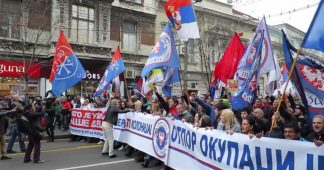By Živadin Jovanovic
We hear that Kosovo and Metohija’s frozen conflict is not conducive to Serbia’s interests, but nobody notes that Serbia stands to lose even more if negotiations under EU auspices continue under the same pattern and trend. Judging by the ongoing course wherein Serbia has been only delivering concessions and Prishtina’s clique only gaining control over the whole Province, Serbia may end up delivering irrevocably all her rights and interests and receiving nothing in return. Except promises of EU membership by 2027 as “indicative” year! Rarely is heard that such a EU/USA deal “territory (of Kosovo and Metohija) for EU membership” would be illegal, contrary to the UN SC resolution 1244, UN Charter, OSCE Final Document and Constitution of Serbia. It would be unacceptable in principle because the state territory, national identity and dignity cannot be treated as trading commodities.
Mere notion of trading Kosovo and Metohija for EU membership is an indication of a sharp decline in awareness of the essence of national identity, dignity, state interests, national and state self-esteem. The fact that, besides the so-called political elite, a part of Serbian intellectual elite, the ‘educated ones’, and even certain national institutions also hold Kosovo and Metohija to be a ‘hanging rope’ that Serbia should promptly get rid of, ostensibly in order to rapidly embark on a wide-ranging economic and social progress, amounts to nothing less than an endorsement of the very dubious message that relevance of the territorial principle is waning, that both Serbia and Kosovo would anyway end up inside the “European community”, that the perspectives of better life outwigh all other values, that Serbia inherently belongs to Euro-Atlantic integrations, that the sitting-on-two-chairs policy is untenable, and the like.
Whatever happens, from the murder of Oliver Ivanović[i] and public lynch of Marko Đurić[ii] through the statements of Priština leaders on ‘Eastern Kosovo’ or on Kosovo up to Niš, through the ‘mutual recognition’ platforms to the rifles from the battle of Košare, Belgrade repeats the chorus line that the dialogue and the EU umbrella has no alternative, that the business is as usual as if meanwhile nothing has happened or changed. Is this tactics? Assuredness? Wisdom? Responsibility? Experience? Foresight? Strenth? Winning combination? Advice of friends or of ‘friends’?
The question to ask is whether any rational agreement with former leaders of terrorist KLA turned politicians is possible at all, even regardless of whether they are on the most wanted lists and whether they enjoy support of their NATO and EU sponsors? Knowing anyway that they indeed are on Interpol warrants and that they do enjoy support of ‘exceptional’ friends…
The reality is talked about selectively, as if it consisted of debts, obligations and restrictions only, as if Serbia were a state without roots, without history, universal rights or memberships in various international organizations, without friends, and as if she depended solely on the mercy of individual members of the EU and NATO! The legality and principles are hushed about, as if both were also advantages of the ‘other side’ which should not be reminded of further arguments in support of its case.
Nothing is said about absolute dominance of geopolitical approaches and interests of the leading Western countries in addressing the Kosovo-Metohija issue. There is not a slightest effort to analyze the impact of new trends in Europe and in global relations on the international position of Serbia and her negotiating capacity. Moreover, there is a perceptible resistance, a weird aversion to the necessity to adapt the negotiating tactics and policy to the altered realities. The impression is that we are perpetually, day in day out, in the grinding machine of those same neocolonial mechanisms for crushing, brainwashing and subduing, disinterested in changing anything except to loyally follow the ‘encouragements’ of on-duty commissioners that are “in the best interest of the future of Serbia”.
Nobody mentions the truth that for the key Western countries to whom, under the Brussels negotiating format, Serbia has effectively ceded resolving of status of Kosovo and Metohija, the only acceptable solution is the one supportive of their confrontation with Russia and China. This goes contrary to the vital interests of Serbia. The hitherto experience confirms that the Brussels negotiating framework excludes the principles of legality, balance, justice, and sustainability, thus precluding Serbia in protecting her legitimate rights and interests, especially those stemming from the UN Security Council Resolution 1244.
It’s been said that EU is the largest investor, largest donor and largest trade partner of Serbia. Although the purpose of linking the above statement with the negotiations with Pristina is not given explicitly and decidedly, there lingers on an unspoken message to the public that this benefaction obligates us to also endorse the unprincipled demands concerning the sovereignty, territorial integrity and the Constitutional order of Serbia. And these demands are as follows: legalization of the forcible creation of a new state in the part of the Serbian state territory; Kosovo’s membership in the UN and all other international organizations; drawing new international borders; another exercise in crushing the Serbian nation; legalization of ethnic cleansing of 250,000 Serbs and other non-Albanians; paving the way for the creation of ‘Greater Albania’.
What covers silence is that EU Member States, especially the richest ones, are the biggest winners of democratization, transition and privatization in Serbia. What is not said is that the banks from EU member states alone have sucked tens of billions of Euros out from the Serbian economy and citizens in the processes of liquidation of the Serbian banks, acquisition of the Serbian financial market, and replacement of DM into Euro. No one has yet bothered to calculate profit gained by economies of those countries during privatization that the Government has labeled as predatory.
The most deafening silence is about NATO/EU member states having inflicted direct material damage to Serbia during the criminal NATO-led aggression of 1999, totaling more than US$ 100 billion. If, in spite of those countries’ clear legal duty to compensate war damages, the highest state authorities still find it disconcerting, for any reason, to initiate the inclusion of this matter in the agendas of pre-accession or any other negotiation, then the basic sense of appropriateness, national dignity and self-respect should request at least a measure of restraint in showering unduly the Western agents with undeserved compliments for their patronage.
It’s talked of the need for a just solution affording each ‘side’ to win some and lose some. Nothing is said about the minimum below which Serbia shall not and must not go on. The reflection of this ‘flexibility’ of Serbia on the position of the ‘other side’ and its mentors is embodied in all sorts of claims brought up on a daily basis and even in unabashed open threats which, by one way or another, are also supported by representatives of the EU, USA, Germany and others. No mention whatsoever is made that within the Brussels negotiation, thus far, all Serbia did is giving her rights and interests away, without gaining anything concrete. Hence, a legitimate question to ask is if there are at all conditions in place for a well-balanced and a just compromise conducive to a durable peace and stability.
No matter what representatives of certain Western countries and their integrations may say, their perpetual blackmailing Serbia and open support to actors having territorial or other claims against Serbia testify that, for them, Serbia will never be too small, too weak or too humiliated to discontinue their crushing her into pieces, weakening and humiliating her.
They say Serbia is getting increasingly stronger and respected; none says she has never been as humiliated, deceived and blackmailed as nowadays. The recently staged publics lynch of Serbian official Marko Đurić and dozens of elected representative of the Serbian people in Kosovska Mitrovica is indicative of the true attitude of relevant actors vis-à-vis Serbia.
They say an agreement is concluded with NATO which will not allow any (military) force enter the North of the Province, whereas KFOR – predominantly composed of NATO troops – in that same part of the Province secures “ROSU” whenever the latter demonstrates, recurrently, its strength, weaponry and equipment acquired from NATO. Does the enduring attitude of EU and NATO towards UNSCR 1244, the Brussels Agreement on Principles, and the Agreement with NATO on the North of the Province, have any bearing for foretelling their position towards any hypothetical new legal documents to be signed, or maybe this question is but rhetorical?
Highest state authorities talk of so-called status-neutrality of the EU and EULEX, even though common sense recognizes this to be a blatant hypocrisy, given that both EU and EULEX in Kosovo and Metohija are implementing the master plan of creating a new member of NATO and the UN, drawing new borders, consolidating ethnic cleansing of Serbian people and pushing them northwards.
It’s been said that Kosovo has long been lost, that the previous governments had delivered it all, that the current governments merely ‘seeks to save what can be saved’, and that the Constitution is no defense. This is supplemented by saying what we need is courage, that we are in for ‘painful decisions’, that Serbia needs other countries, especially Germany, more than they need Serbia, and so on, and so forth.
BUT! If other, previous governments have already lost or delivered it all, wherefore all this commotion of pressures, lies, hypocrisy, blackmails and humiliations on the one hand, and lavishing offers of donations, investments and accolades to the sitting government, on the other? We are witnessing a mixture of arm-twisting and charm offensive at play.
To whom is intended and what is the purpose of statement that Serbia needs Germany and other countries more than they need Serbia? Whatever was it to necessitate such comparison, what objective is it designed to achieve? Does this mean that, in lieu of the equality, mutuality, reciprocity and independency, Serbia is to willingly endorse and proclaim the principle of subordination? What other reasons could possibly drive German investors to invest in Serbia if not those of own interests, profit, and sky-high subsidies from the Budget of Serbia?
Statements of the Serbian representatives abound with contradictions, mood extremes ranging from enthusiasm to frustration. Within such setup, the very meaning of certain terms routinely used in the political life becomes obscure. For instance, should the courage be exercised in defense against unlawful, unprincipled and blackmailing demands, or in acceptance thereof to the detriment of Serbia?
Belittling the official position of the national leadership of France that the priority is the EU’s reform (read: survival) as opposed to its enlargement, and placing the misleading interpretations that it is possible to conduct in parallel both EU reforms and enlargement, amount to a call to bury the hand in the sand. In light of the trend of growing divisions and uncertain outcome of the EU’s long-term reforms, the tales of enlargement involving the Western Balkans only serve to conceal the naked truth that enlargement is getting increasingly distant and uncertain. One may reasonably surmise these tales will live on, because a formal decision (confession) that any new accession is indefinitely laid aside or postponed (sine die) would damage the credibility of all who have proclaimed EU membership to be the ‘course without alternative’. Admittedly, this could deepen instability, backfire onto EU and render the reforms even more difficult.
Silence fell on the EU’s shameless exploitation of Serbia’s aspiration for membership aiming to trick Serbia into drawing new borders, into unlawful creation of a new state on a part of her state territory, into a fresh division of the Serbian nation and unification of the Albanian nation, into pardoning NATO for the crime of aggression, and for the sake of lessening intra-EU divisions. EU’s and NATO’s joint geopolitical goal to make Serbia sign a ‘comprehensive legally binding document’ thereby recognizing Kosovo, if achieved, would convert an illegal unilateral secession into a legal and consensual one.At this point, the argument of Kosovo secession being a dangerous precedent would be negated or at least heavily weakened due to the presumption of Serbia’s approval. In turn, this would usher in a realistic chance for the EU to remove a cause of serious internal divisions which blocks its functioning (since five MSs do not recognize independence of Kosovo).
We are told that the negotiations’ goal is to achieve historic reconciliation between the Serbian and the Albanian nations, and then again we are told, correctly, that we are not negotiating with the Albanians but instead with the USA, the UK, and Germany. No comment whatsoever that such negotiations and the proclaimed goal of ‘historic reconciliation’ are mutually conflicting. The great powers do not resolve crises, they manage them. This is particularly true within the backdrop of the growing global confrontation we are presently witnessing.
The ‘comprehensive legally binding document’ is publicly claimed to be a ‘blank paper’ whose future contents are unknown. Nothing is said of the state of reasoning that allows an advance endorsement of a document whose wording is not known to anyone including the presumed signatories on behalf of Serbia.
For the most part, no references are made of UNSCR 1244 being the basic comprehensive legal document of ultimate importance which obligates all members of the UN including EU and NATO member states, which is of lasting applicability, which may not be repealed, replaced or invalidated otherwise than following the same procedure in which it was adopted, and which, however, has not been implemented in a single provision thereof that provides for the right of Serbia and the Serbian people. It is unclear who or what prevents or discourages Serbia from demanding the observance and implementation of the pending obligations under this document? What does Serbia stand to gain by keeping silent on this Resolution? What is in it unfavorable for Serbia and, perhaps, beneficial for Pristina?
What we are listening is that the previous governments made crucial mistakes: firstly, by having addressed the International Court of Justice requesting its advisory opinion in a flawed wording, and secondly, by having enabled the transfer of negotiations to Brussels under EU’s ‘good services’ by means of so-called ‘jointly proposed resolution’ (of Serbia and the EU) at the UN General Assembly. Both is true. However, what we have not heard is that both the ICJ’s opinion and the UN General Assembly’s resolution on EU’s services are not of a binding but rather of an advisory character and, as such, do not prevent Serbia to undertake to remedy the mistakes. While mistakes made by the previous governments are condemnable indeed, those can hardly serve as an excuse for making the same or even graver mistakes today or in the time to come.
What in particular has never been uttered is that advisory opinions and advisory resolutions of any UN body or agency do not interfere, in any way, with the powers of the Security Council or prevail over the applicability of UNSCR 1244.
It’s been repeated, time and again, that Kosovo is lost and the government is merely ‘saving what is possible to save’; we are listening talks of difficult negotiation position, realities on the ground; past mistakes, delusions, misconceptions and myths; failure to understand true values and interest. The public is under constant bombardment of forecasts of disaster should the conscience of the nations is not altered; our history, Constitution, inherent characteristics of the nation are being depreciated. In the stead of long-standing cultural, moral, spiritual, historical and principled criteria, we are being offered solely with economic, trading, dealing, selective approaches and criteria. As if the acceptability of the latter is being relied upon among the impoverished and Western-propaganda-disoriented population.
One is left dumbfounded by total absence of efforts to identify, present or use any argument or fact in support of strengthening the negotiation position of Serbia. It is as if the biggest problems of the leadership are its own nation’s wrong conscience and system of values, rather than the anti-Serbian politics of the Western centers of power. In particular, there are no efforts to research and discover new and less known arguments that strengthen our negotiating capacity. This single-sided focus on accentuating all that hampers the negotiation position of Serbia coupled with total disregard for arguments favorable to Serbia articulated has debuted as a phenomenon unprecedented in the contemporary history of international affairs.
Parts of the Serbian elite are already ‘networked’ into the Western liberal multinational corporative system, tying their own privileges and the future to the interests of such neocolonial establishment, regardless of the price to be paid by the state and the nation in terms of the loss of independence, identity and, ultimately, the territory. Parts of society calling themselves elite acquire substantial material privileges by taking part in projects generously funded from EU & NATO sources, in activities of the so-called civil sector (NGOs), various task forces, forums, centers, conventions, associations, and the like. Hence, it is only logical that lines they publicly advocate, including in the so-called internal dialogue on Kosovo and Metohija, conform to, and replicate expectations and interests of the centers of power funding their operation. Their interpretation of national and state interests and public statements more or less openly implying that Serbia should recognize Kosovo and Metohija as an independent state, are the direct result of their interest in preserving own privileges. Their assigned role is to persuade the public that ‘better life’ depends on endorsing the ‘painful’ pragmatic decisions of the authorities.
We are told of significance of the First Brussels Agreement on Principles for Normalization and its provisions on the Community of Serbian Municipalities. In this narrative, said Agreement is even likened to the Dayton-Paris Agreement which is, to put it mildly, an exaggeration (not the only one). Even after it dawned on us all that back in 2013 Serbia was tricked into signing what, five years on, got exposed as a fraud, the persuasion of the public of necessity to sign a new ‘comprehensive legally binding document’ relentlessly goes on!
We are told we must save our people in Kosovo and Metohija. True, by all means. Let us leave aside, for a moment, the question whether we agreed with the Serbian people in Kosovo and Metohija being hostages of arbitrariness of the Pristina’s leadership (and their mentors) thus being left only with the margin for protecting them solely by endless retreats and by satisfying that leadership’s every last whim; still, one always asked and never answered question is why has the right of 250,000 expelled Serbs and other non-Albanians to free, safe and dignified return to their homes and property in the Province been left unspoken of for so long? Who and why finds it disconcerting to insist on negotiating on this vital, priority interest of Serbia and the Serbian people? Sporadically, a muttered ‘explanation’ is given to the effect that this issue has been raised but the ‘other side’ refused to discuss it. What kind of argument this is? What is the extent and the list of things we ought to forsake in order to maintain the label of flexible, tolerant, responsible, wise, courageous, and predictable Europeans?! Does this mean that Serbia is obliged to only negotiate the matters of interest for the ‘other side’? What kind of future is one for the sake of which Serbia needs to consent to ethnic cleansing of a significant number of own nation from Kosovo and Metohija? With whom, and on behalf of which ‘common values’ is Serbia to negotiate, given that neither EU, nor USA, Germany, France, Italy, EULEX, UNMIK, KFOR, NATO, OSCE want to fulfill this obligation towards the Serbian nation? Hopefully, none will here resort to ‘convincing’ counter-arguments such as a debatable number of persons interested in return, or the matter of limited financial resources, and the like.
It’s been said that Serbia’s most important goals of the EU-facilitated negotiations are peace, stability and development. It is not said that the peace following NATO’s 1999 aggression against Serbia (the FRY) was not concluded in negotiations with the EU but in negotiations involving the Federal Republic of Yugoslavia, the USA, the Russian Federation, the EU, G-8, and five permanent members of the UN Security Council. The conditions and the presumptions of peace were confirmed by UNSCR 1244. It has never been recalled that the basis of the peace constitute the Milosevic-Ahtisari-Chernomyrdin Agreement of June 3, the Military-Technical Agreement of June 9, and UNSCR Resolution 1244 of June 10, 1999.
Nothing is said of the fact that, together, these mutually integrated documents constitute the basis of sustainable peace, stability and development in the region and in Europe; nothing is said of the fact that do not and cannot exist any multilateral, bilateral or other documents legally or politically prevailing UNSCR 1244; nothing is said of the fact that there is no way for Serbia to renounce UNSCR 1244, either voluntarily or under coercion.
Nobody reveals that sidelining, ignoring or renouncing UN SC R 1244 is tantamount to renouncing peace and stability in Europe. The solution for Kosovo and Metohija the West wants is one exclusively serving their confrontation with Russia. None other solution is acceptable to the West.
This is why Serbia has to table request for full implementation of UNSCR 1244 without delay, because this is the only avenue capable of delivering a legitimate, lawful and just solution which serves the interests of peace, stability, and sustainable development.
[i] Serbian politician from Kosovo and Metohija, killed January 16, 2018, In Kosovska Mitrovica, northern Kosovo
[ii] Director of the Government Directorate for Kosovo and Metohija
Translation from Serbian: Branislava Mitrovic











